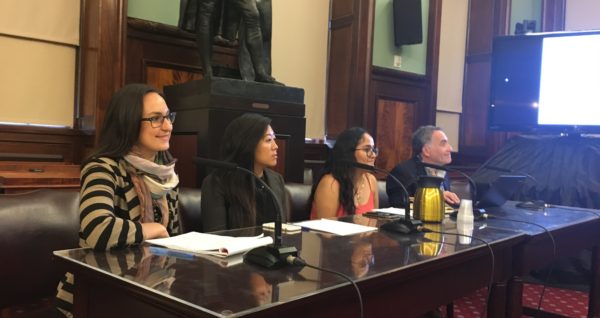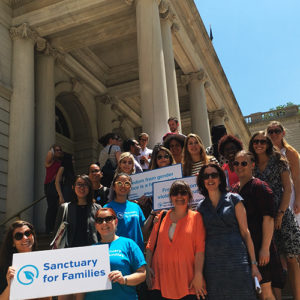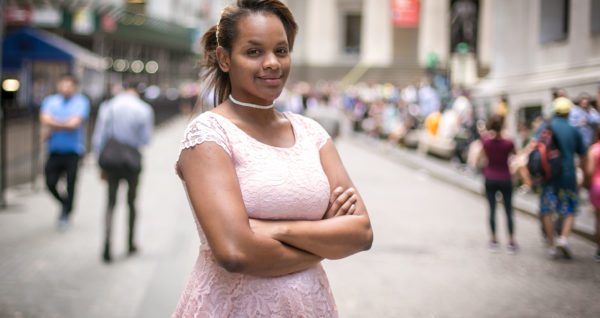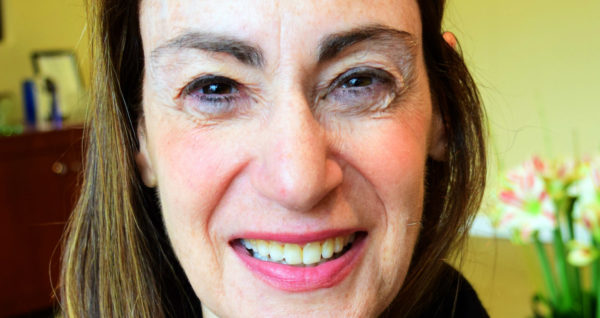Over the last month and a half, Sanctuary has joined with fellow immigrant and social services providers, New York City Council members, the State Attorney General, and acting Brooklyn DA to call on ICE to stop raids and arrests in New York courthouses. Read the remarks and testimonies our staff have delivered.
On the morning of Friday, June 16th a Chinese woman at the Queens Human Trafficking Intervention Court was about to have her case adjourned when Judge Toko Serita called her attorney from Legal Aid Society to the dais. According to Judge Serita, immigration agents were waiting outside the courtroom to detain her. In an effort to protect their client, the Legal Aid attorneys asked the judge to set bail so that the client would be held in custody thereby providing her attorneys with time to make a plan. Watching the U.S. Immigration and Customs Enforcement (ICE) agents circle the courtroom, attorneys and clients waiting in the hallway began to panic.
Many of the defendants in New York City’s Human Trafficking Intervention Courts are immigrants and the increasing reports of arrests at or near courthouses has only served to fuel the climate of fear already prevalent within immigrant communities. Over the last month and a half, Sanctuary has joined with fellow immigrant and social services providers, New York City Council members, State Attorney General Eric Schneiderman, and acting Brooklyn District Attorney Eric Gonzalez to call on ICE to treat courthouses as sensitive locations, similar to houses of worship and schools, and stop raids and arrests in New York courthouses.
Read the remarks our Executive Director Hon. Judy H. Kluger delivered on the steps of City Hall, the testimonies Sanctuary staff members Yvonne Chen and Carmen Rey gave at the June 26th New York City Council hearing, and the speech staff attorney Jillian Rudge prepared for the State Attorney General and acting Brooklyn District Attorney’s August 3rd press conference.
—
Written remarks of Hon. Judy Harris Kluger
Rally on the steps of City Hall
June 22, 2017
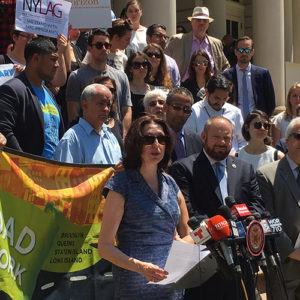 Good morning. I am Judy Kluger, Executive Director of Sanctuary for Families – one of New York’s leading advocates and service providers for human trafficking and domestic violence survivors. But, before I came to Sanctuary in 2014, I had the privilege of serving as a New York State Judge. One of the proudest moments in my years on the Bench was working with Chief Judge Lippman to spearhead the creation of Human Trafficking Intervention Courts.
Good morning. I am Judy Kluger, Executive Director of Sanctuary for Families – one of New York’s leading advocates and service providers for human trafficking and domestic violence survivors. But, before I came to Sanctuary in 2014, I had the privilege of serving as a New York State Judge. One of the proudest moments in my years on the Bench was working with Chief Judge Lippman to spearhead the creation of Human Trafficking Intervention Courts.
When we created these courts, we envisioned them as a place that would offer a compassionate and comprehensive response to the problem of human trafficking in New York. To this day, these Courts serve as an intervention to help people break the cycle of exploitation and arrest.
The majority of defendants before the Intervention courts are vulnerable immigrants. I am appalled that Immigration and Customs Enforcement agents showed up at a Human Trafficking Intervention Court in Queens to arrest a victim of sex trafficking whose case was on the docket that day. Their actions violate the absolute sanctuary that these courts offer people who have been victimized and brutalized by violent pimps and johns. But the ICE agents’ intrusion into the Human Trafficking Court is not the only cause for alarm.
Their presence in our courts is having a chilling effect on domestic violence survivors who seek protection from their abusers in our Family Courts, places that should be safe havens for traumatized victims and their children. How can Sanctuary for Families – and other service providers – urge clients to get the lifesaving remedies they need, when deportation hangs over their heads?
No one should be afraid to seek justice in a court of law and ICE’s actions are spreading waves of fear among the most vulnerable among us. If this continues, ICE will drive trafficking and domestic violence away from the courts and into the world of violence they are trying so desperately to escape.
—
Written Testimony of Yvonne Chen, Manager of Outreach,
Anti-Trafficking Initiative, Sanctuary for Families
Submitted to:
The New York City Council, Committee on Courts and Legal Services
Chair, Council Member Rory Lancman
Hearing on June 29, 2017
Good afternoon. My name is Yvonne Chen, and I am the Manager of Outreach for the Anti-Trafficking Initiative at Sanctuary for Families, one of New York City’s leading providers of services for survivors of trafficking and other forms of gender-based violence. We are grateful to the New York City Council for the opportunity to testify today—and to Council Member Lancman for calling this urgent hearing to discuss the crisis triggered by U.S. Immigration and Customs Enforcement appearances in our city courtrooms.
Most recently, less than two weeks ago, ICE agents entered the Queens Human Trafficking Intervention Court, a problem-solving court whose goal is to identify trafficking victims and offer comprehensive services to assist them in escaping their abuse, not only from the massage parlor owners and brothel keepers who hold them captive, but from the thousands of sex buyers who rape them with impunity. As such many, if not most, of the defendants are themselves victims of horrific crimes, and feel hopeless about their prospects for getting help.
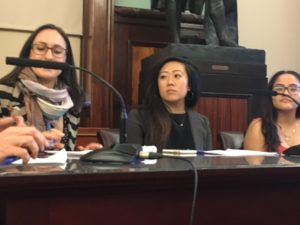
The terrifying appearance of three male ICE agents, to detain them rather than investigate the abuses against them, not only failed to protect public safety: by eviscerating the trust the courts had carefully nurtured, ICE aided traffickers in instilling the kind of fear in victims that discourages them from seeking justice.
Sanctuary was closely involved in the creation of the Human Trafficking Intervention Courts (HTICs) in New York City and statewide over the past five years. These courts are a powerful means of identifying trafficking victims, offering them social and legal services as an alternative to criminal conviction. In partnership with some of New York’s preeminent law firms, Sanctuary launched a Pro Bono Project at the Queens HTIC in June 2014. Today, hundreds of trained lawyers provide high-quality legal services to trafficking victims including immigration, public benefits, family law and criminal conviction vacatur. Perhaps even more importantly, these mandated consultations are an opportunity to identify indicia of severe forms of trafficking.
Since the launch of the HTICs, Sanctuary has provided immigration consultations and counseling services to increasing numbers of victims in Queens and in Brooklyn—from 57 in 2014, to 370 in 2016. Among service providers working in the City’s trafficking courts, Sanctuary has elicited the highest rates of victim disclosure, due to the culturally and linguistically sensitive and trauma-informed interviewing techniques utilized by our staff and pro bono partners. The outcomes reveal a brutal industry that preys upon some of the most defenseless members of society—many of them Chinese and Korean women, most of them mothers and, in some cases, grandmothers—who come from impoverished rural communities with little education. Hoping to escape abuse in a land that they believed valued human dignity, these women instead have been coerced into providing sexual services through debt bondage and under threats of arrest and deportation.
On June 16, ICE sought to detain one such defendant, a Chinese woman believed to be a trafficking victim, who, like many of the East Asian defendants seen by Sanctuary, had been arrested for unlicensed massage. This young woman had been in touch with Sanctuary in the past, and was on track to have the charges against her dismissed after completing her mandated services. Instead, by complying with the legal requirement to appear in court as scheduled, she suddenly risked detention and deportation. All of this occurred in front of dozens of other immigrant defendants in the same situations—and many surely resolved at that moment never to return or complete their services.
Victims seeking justice in the courts—whether trafficking survivors in the HTICs, or domestic violence survivors in Family Court—should never be fearful of accessing protections offered by the criminal justice system. These courts should remain havens for traumatized victims. How can Sanctuary and other service providers responsibly encourage clients to seek the lifesaving help they need in the courts while the menacing presence of immigration agents are likely to be there? This only makes our city LESS safe: immigrant crime victims are driven into the shadows, less likely to report crimes for fear of arrest and deportation, while their exploiters flourish, emboldened with this extra layer of fear they can use to coerce their victims into submission. And it weakens the efforts of service providers, who can no longer reassure clients that they will be safe in the courts.
To illustrate this, let me describe to you the scene at court when ICE agents appeared on the scene two weeks ago: after court broke for lunch, two Chinese women approached me anxiously, questioning why ICE was there and if they were going to be deported next. They were terrified to even exit the courtroom and asked me to escort them outside so they could get some food, as they had been waiting since early morning for their case to be heard. As we were about to exit the courthouse, they panicked and decided to remain huddled inside the courthouse rather than risk arrest. I could tell they were famished, but because they could not bring themselves to step outdoors, the best I could do was bring them some stale bagels. As I sat with them for a few minutes, they wondered how they could possibly finish their sessions and return to court given the risk that doing so could cause them to be deported.
The mental health ramifications on a population of immigrants such as those in Queens, scores of whom fled traumatic experiences of state control in China, is chilling. Coming from places where corruption runs rampant, our clients experience overwhelming anxiety and paralyzing fear of public systems, especially the justice system. As a result, we must repeatedly explain to them that we are not representatives of the court or immigration.
Our multilingual staff works hard to gain their trust so that clients understand our assistance is safe and confidential. However, having been betrayed by supposed friends who trapped them into illicit massage parlors, where customers are often permitted to beat, rape, stab or strangle them for their sexual pleasure, fear and suspicion remain high. Unfortunately, the challenge of identifying victims and gaining their trust is getting more difficult, not less. Given the anti-immigrant sentiment expressed by the current federal administration, non-citizen victims are so terrified of the risk of being deported just for reporting their abuse, they choose not to come forward at all.
Immigrant victims must not be allowed to believe what their traffickers tell them: if you try to escape and seek help, the American government will arrest you and lock you up instead. Our courtrooms must remain a sanctuary for victims of crime seeking justice. Thank you for listening to this testimony—and thank you for your work on behalf of our most vulnerable neighbors.
—
Written Testimony of Carmen Maria Rey, Esq., Deputy Director, Immigration Intervention Project, Sanctuary for Families
Submitted to:
The New York City Council, Committee on Courts and Legal Services
Chair, Council Member Rory Lancman
Hearing on June 29, 2017
Good afternoon. My name is Carmen Maria Rey. I am the Deputy Director of the Immigration Intervention Project at Sanctuary for Families, one of New York City’s leading providers of legal, clinical, housing, and employment services for survivors of human trafficking, domestic violence, and other forms of gender-based violence. We are grateful to the New York City Council for the opportunity to testify today, and to Council Member Lancman for calling this hearing to discuss the impact of having agents from U.S. Immigration and Customs Enforcement (ICE) present and engaging in immigration enforcement efforts in New York City’s courtrooms.
The presence of ICE in New York’s courtrooms deeply concerns us because it has unquestionably created a chilling effect on victims of domestic violence and trafficking seeking to exercise their legal rights in New York’s Courts.
A recent survey conducted by The Immigrant Defense Project this June found that of 225 advocates surveyed, 74% reported having worked with immigrants who expressed fear of the courts because of ICE’s presence there, and a further 45%—that is, close to 110 advocates—reported having worked with immigrants who failed to file a petition, or who withdrew a petition because they were afraid of encountering ICE in the court. Most concerning for us as attorneys and advocates working with survivors of domestic violence and trafficking, 67% of survey respondents working with survivors reported having had clients who decided to not seek help from the courts because they feared encountering ICE there.
These survey results are extremely troubling. Abusers and traffickers share one common trait: they exercise power and control as an instrument of abuse, attacking their victims where they are most vulnerable to keep them under their control. For immigrant victims, especially those with tenuous or no immigration status, the weapon of choice is clear: abusers and traffickers routinely threaten their victims with deportation and permanent separation from their U.S.-born children and other family in the U.S. as a tool to prevent them from calling authorities and ending the abuse.
For decades, organizations like Sanctuary have worked tirelessly to gain the trust of immigrant victims and assure them that if they come forward to report the crimes committed against them, we can keep them safe from their abusers and traffickers; that ICE will not be able to just find them and take them away, and that, most importantly, they will be safe with our law enforcement officers and with judges in our courts.
That trust that we developed over decades has been severely damaged since January of this year. Routinely now the news report incidents of ICE arresting litigants in our courts—even attempting the arrest of a survivor of human trafficking in the Queens trafficking part two weeks ago. This lends credence to the threats victims have heard for years—sometimes decades—from their abusers and traffickers. These days, even in our professed “sanctuary city”, being an immigrant in a courthouse seeking to exercise your right to safety and protection may well lead to arrest, detention, and deportation by ICE.
Over the past several months, immigrant clients have been particularly apprehensive about going to Family Court to seek orders of protection, custody and child support. They have even expressed concern about protecting their property rights in divorces: “If I make my husband mad, he will call ICE to come and get me in the courtroom.”
Of the hundreds of our clients that have been too afraid to proceed with litigation in the Courts, one of the most heartbreaking stories is that of one of my longtime clients, Maria, who is too afraid to seek an order of custody and visitation in Family Court against her daughter’s father, a man who beat her brutally for over a decade and recently kidnapped their daughter.
Maria’s abuser knows that she entered the country unlawfully and that, in 1998, at the age of 17, she was convicted of a minor drug-related crime. This means that, despite having lived in the United States for nearly thirty years, and having a young U.S. citizen daughter, Maria is a priority for deportation. Her abuser knows this, and has threatened Maria that if she tries to get her daughter back, he will call immigration and have her deported. He doesn’t know where she lives, but if she files for custody, he can tell ICE where she will be on the day of her Court hearing, and they will likely come to arrest her.
This means that Maria is too afraid to seek the one legal remedy that would be available to her—suing for custody and visitation in Family Court—because she is too afraid to come to the attention of immigration authorities and be deported from the U.S. and never see her daughter again. And as advocates for Maria, as the situation currently stands, we unfortunately cannot assure her of her safety in court.
In closing, we strongly believe that the courts must remain a sanctuary for all New Yorkers in need of help, and that ICE’s presence in the courts has had a tremendously damaging effect on immigrant victims of domestic violence and trafficking in need of protection from the courts.
Thank you again for the opportunity to testify.
—
Written remarks of Jillian Rudge (never publicly delivered)
Press conference co-hosted by State Attorney General Eric Schneiderman and acting Brooklyn District Attorney Eric Gonzalez
August 3, 2017
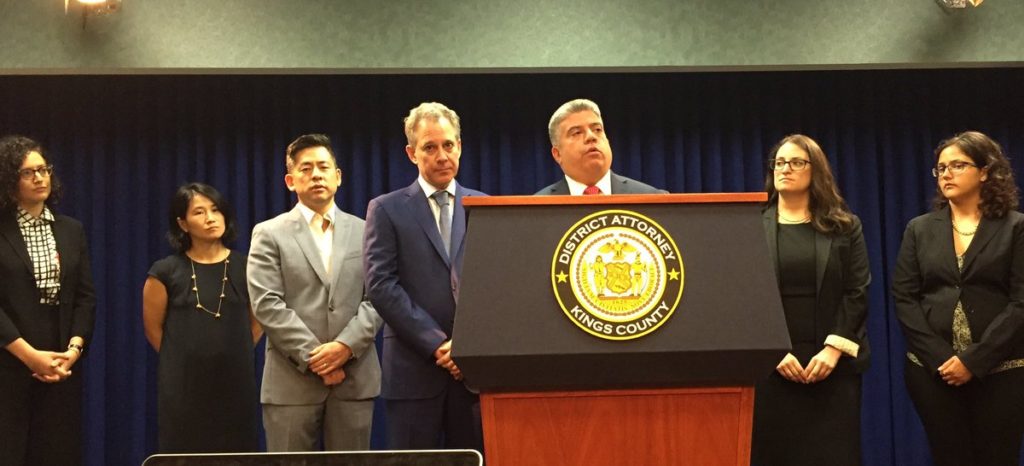
Good morning. My name is Jill Rudge. I am an Immigrant Justice Corps Fellow and Staff Attorney at the Immigration Intervention Project of Sanctuary for Families – the City’s largest provider of legal services for victims of domestic violence and human trafficking. Sanctuary for Families provides services to some 17,000 adult and child New Yorkers per year, and over 70% of our clients are immigrants who come from over 140 countries.
We are grateful to Attorney General Schneiderman and District Attorney Gonzalez for the opportunity to join the voices calling for to ICE raids in our courthouses. We too are concerned that ICE’s presence in our courts undermines access to justice for New Yorkers because it deters non-citizens from accessing the courts as both cooperating witnesses on criminal prosecutions, and as litigants in civil cases – which is especially harmful to victims of domestic violence and human trafficking.
ICE’s presence in our Courts breeds fear, and abusers and traffickers exploit that fear to ensure that victims are too afraid to help put an end to their exploitation. Along with other legal providers across NY State, we have noted a marked increase in the number of our clients who cite fear of deportation as a reason to not call police or cooperate in a prosecution of their attacker or trafficker. A recent Immigrant Defense Project survey reports that 74% of advocates polled across New York are experiencing the same uptick at their organizations, and that nearly 70% of those working with survivors of domestic violence or trafficking reported having clients who decided to not seek help from the courts because they feared encountering ICE there.
One example of the choices victims are being forced to make daily across New York State is the situation being faced by our longtime client Maria, who, like many of our clients, is too afraid to seek an order of custody and visitation in Family Court against her daughter’s father, a man who beat her brutally for over a decade and recently kidnapped their daughter. Maria’s abuser knows that she entered the country unlawfully and that at the age of 17, she was convicted of a minor drug-related crime. Despite having lived in the United States for nearly thirty years, and having a young U.S. citizen daughter, Maria is a priority for deportation. Her abuser uses this information to threaten her that if she goes to Court to get her daughter back, he will call immigration and have her deported. He doesn’t know where she lives, but if she files for custody, he can tell ICE where she will be on the day of her Court hearing, and they will likely come to arrest her. This means that for the first time ever, Maria is too afraid to seek the one legal remedy available to her—suing for custody and visitation in Family Court—because doing so means coming to the attention of ICE and never seeing her daughter again.
Maria’s story also highlights how the presence of ICE in our courts is not just an immigrant issue. Immigrant families are of mixed immigration status, and include United States citizens. Whole families and communities are being negatively impacted by the fear generated by ICE’s presence in our courts. This is not just an immigrant’s rights issue – this is an access to justice issue concerning all New Yorkers.
For decades, organizations like Sanctuary have worked tirelessly to gain the trust of immigrant victims and assure them that if they come forward to report the crimes committed against them, we can keep them safe from their abusers and traffickers; that ICE will not just find them and take them away; and that, most importantly, they will be safe with our law enforcement officers and with judges in our courts. That trust developed over decades has been severely damaged by ICE’s arrest of immigrant New Yorkers in our court. As a result, victims are going unprotected, and witnesses are being silenced. Even in our “sanctuary city”, being an immigrant in a courthouse seeking to exercise your right to safety and protection may well lead to arrest, detention, and deportation by ICE.
In closing, we strongly believe that the courts must remain a sanctuary for all New Yorkers in need of help, and that ICE’s presence in the courts has had a tremendously damaging effect on immigrant victims of domestic violence and trafficking in need of protection.
